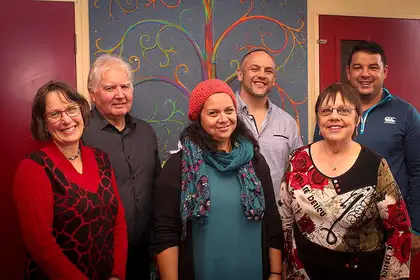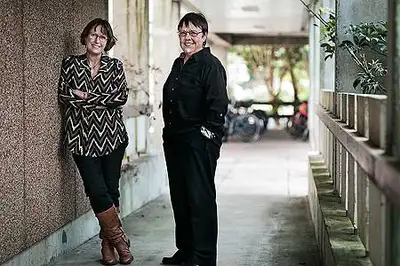
From left: Professor Jackie Sanders, Te Aroha Noa chief executive Bruce Maden, Theresa Chick, Te Aroha Noa, Brad Rapira, Te Aroha Noa youth project coordinator, Professor Robyn Munford and Rene Aish, Te Aroha Noa.
Te Aroha Noa, a community development agency working with young people in Palmerston North, has been awarded $300,000 from the Vodafone Foundation to work with Massey University to extend support to vulnerable youth.
The agency, selected by the Vodafone New Zealand Foundation, is one of two 2017 Extension Partnership grant recipients. The other organisation is the MOKO Foundation, a charitable trust empowering communities in the Far North. Each organisation will receive $300,000 over three years and on-going support in partnership with the Vodafone New Zealand Foundation.
Massey’s School of Social Work staff have been working with Te Aroha Noa on research projects for the past decade, offering professional development workshops and researching effective practice in work with whānau/families. Staff from Te Aroha Noa also contribute to the Social Work programmes offered at Massey’s Manawatū campus.
Professor Robyn Munford and Professor Jackie Sanders are co-leaders of two major longitudinal research projects, Pathways to Resilience and Youth Transitions, funded by the Ministry for Business, Innovation and Enterprise. Both studies focus on the use of services that vulnerable young people encounter.
The professors are working with Te Aroha Noa as advisors for the project they have received funding for, entitled He Ngakau Rangatahi.
Bruce Maden, Te Aroha Noa chief executive, says marginalised youth have had disrupted educational histories and have been excluded from both mainstream and alternative education programmes. “While they are making significant changes in their development and are beginning to create pathways to positive outcomes, their ability to sustain this transformative change is severely constrained by family/whānau and risks such as mental health issues, family violence and substance abuse. To address this challenge, Te Aroha Noa will use this grant to engage whānau in the change processes by identifying with them their resources, knowledge and barriers to change,” Mr Maden says.

From left: Professor Jackie Sanders and Professor Robyn Munford. Photo credit: Jane Ussher.
Professor Munford says the relationship with Te Aroha Noa is important for Massey “as it enables the direct translation of research findings into practice and strengthens our partnership with community stakeholders, and important for social work students who are often employed by agencies like Te Aroha Noa.
“Our studies tell us that once young people fall out of education, chances are they will go on to experience poor outcomes – ending up in the criminal justice system, or with a lot of major life challenges ahead. They slip between the cracks and may be expelled, and then they become a problem for somebody else to solve. The process of solving that problem takes time,” Professor Munford says.
Professor Sanders says Te Aroha Noa promotes keeping young people engaged by being creative. “The next step could be to have agencies like Te Aroha Noa working in partnership with schools to find a way to support young people to stay in education. Te Aroha Noa has concentrated its approach on creating an environment that supports developing emotional wellness first. When this is achieved, young people naturally want to engage in learning.”
Te Aroha Noa youth project coordinator Brad Rapira says the centre hopes to work with mentor educators within the school communities to look beyond disruptive and challenging behavior and address creatively the needs that lie behind these behaviours.
The funding means the centre can now realise a long held-dream in extending support to the families of young people they work with, he says.
“We support young people to re-engage in learning pathways. We have always wanted to say to the families, we need you to be part of this difference. Tell us your hopes and dreams for your children, tell us about your family wisdom and knowledge, tell us about the things that got in the way and let us alongside you assist and guide these dreams to fruition.
“If we give these families the hope and belief that things can be different for them and their children, it will spread virally. We are indebted to Massey University for assisting us to be highly intentional in our interactions with the young people and in helping us to identify the alternative cultural conditions in which positive growth can take place,” Mr Rapira says.
Click here to watch a video about Te Aroha Noa and the work Massey University does with the centre. Video credit: Jaylan Boyle from NZ Science Teacher.